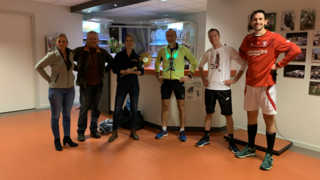We are Friends of VetMed
You want your animals to be healthy. And so do we!
That’s why we support scientific research, and innovative approaches towards (veterinary) patient care that protect and improve the health and welfare of animals and humans.
Your gift makes it happen. Today. Tomorrow. Together.
Go to our general donations page or support a specific project.
Let’s make a difference. Let’s get all our ducks in a row.

Themes
View allCampaigns
View allStop the no. 1 elephant killer!
Start fundraising!
Create your fundraising page or join a team with friends, co-workers, your sports team or class mates. Take a look at these inspiring examples.
H-PWR | Paardenwelzijn in orde bij interactie met veteranen met PTSS
08-05-2025 | 19:24Paarden ervaren geen stress tijdens interacties met veteranen met therapieresistente PTSS. Onderzoekster Chantal Kapteijn heeft de resultaten van onderzoek dat ze samen met collega’s doet naar het gedrag van de paarden, hun hartslag en hartslagvariabiliteit gepubliceerd in het tijdschrift Animal Behaviour and Welfare Cases.
Het onderzoek maakt deel uit van het project Horsepower. In dit project doorlopen groepen veteranen met therapieresistente PTSS een traject van twaalf weken, waarbij ze onder begeleiding in contact worden gebracht met paarden. Onderzoekers van de faculteit Diergeneeskunde onderzoeken het effect van de interacties op de veteranen, maar ook hoe het welzijn van de paarden beïnvloed wordt. Voor de veteranen gebruiken ze vragenlijsten en meten ze fysiologische parameters. Voor de paarden gaat het om fysiologische parameters en bestuderen ze daarnaast het gedrag van de dieren.
<span class="fr-mk" style="display: none;"> </span><span class="fr-mk" style="display: none;"> </span><span class="fr-mk" style="display: none;"> </span><span class="fr-mk" style="display: none;"> </span><span class="fr-mk" style="display: none;"> </span><span class="fr-mk" style="display: none;"> </span><span class="fr-mk" style="display: none;"> </span>
“In de vrije interactie, waarbij de veteranen de paarden bijvoorbeeld aaien, zie je geen verschil in hartslagvariabiliteit als je het vergelijkt met een normale situatie”, aldus Kapteijn. “Ook zijn er geen grote verschillen over de weken heen. Alleen in de eerste week, was sprake van een afwijking, dus dat lijkt erop te wijzen dat de paarden zich de eerste week even aan de nieuwe situatie moeten aanpassen.”
In de gerichte interacties, waarbij de veteranen bijvoorbeeld op de paarden rijden, zijn er wel grote verschillen qua hartslag met zowel de baseline als de vrije interactie. “Dat is verklaarbaar omdat de paarden in die interacties veel meer fysieke activiteit vertonen. Je ziet dan ook dat de verschillen binnen de gerichte interactie tussen de weken heel groot zijn. De hartslag ligt hoger en hartslagvariabiliteit lager in de weken dat er gereden wordt of gelongeerd wordt.”
De gedragsmatige parameters zijn alleen gemeten tijdens de vrije interactie. “Deze veranderen niet over de weken heen. We zien dat de paarden het grootste deel van de tijd doorbrengen in aanwezigheid van de veteranen, positief sociaal contact van hen ontvangen en met hun oren naar voren staan. Dat zijn allemaal indicatoren dat de paarden het aaien niet vervelend vinden, ze kunnen immers ook weglopen bij de veteranen, want ze staan los in de cirkel.”
Komende tijd gaat Chantal en het team van Horsepower alle overige data analyseren, en de resultaten publiceren. Ondertussen worden fondsen geworven voor Horsepower 2.0, waarbij ook de familieleden van veteranen met therapieresistente PTSS onderdeel vormen van het traject.
Lees de casestudie over het welzijn van paarden hier.
Horsepower 1.0 is mogelijk gemaakt dankzij donaties van de partners en donateurs van Vrienden Diergeneeskunde. We zijn bijzonder dankbaar dat we samen zorgen dat veteranen en hun naasten de steun krijgen die ze verdienen!
Maak samen met ons het verschil, steun H-PWR 2.0: Paardenkracht voor veteranen en hun naasten!
Top teams
View all-
 1
€1,151
1
€1,151
Dierenkliniek de Berg
Het Veterinair Vuur in Amersfoort -
D
2
€1,010
De Vrolijke Mammoettanker
Een mooie toekomst voor dier en mens -
 3
€826
3
€826
Team Diergeneeskunde
Kilometer voor kilometer krijgen we kanker klein -
 4
€665
4
€665
Birdsymposium
Blij in de veren? Onderzoek zal het ons leren! -
 5
€570
5
€570
Dierenartsenpraktijk Veterinair Centrum Someren
Het Veterinair Vuur in Someren

















































